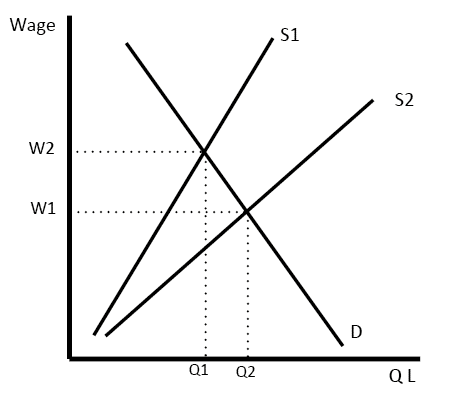Individuals choice of job/career/occuption will depend on how attractive the job is compared to the alternatives. Individuals will be influenced by various factors such as the wage levels, skills required and the likely satisfaction gained in the job.
The supply of labour to particular occupations will depend on several factors.
- Wages. All things being equal, higher wages, will make a particular occupation more desirable. Students are more likely to choose a high paying profession than low-paying profession
- Non-wage factors. However, wages are not the only factor that will influence the choice of occupation, there are also non-wage factors which influence how attractive a job is, such as:
- Qualifications and skills required. Often the highest paying jobs require challenging qualifications. For example, a lawyer is highly paid. However, it requires a three-year degree and then extra training to gain a lawyer’s qualifications. The length of time required for study will put many people off. Also, becoming a lawyer requires not just time, but sufficient intelligence, quick wit and ability to speak in a courtroom. Young people may feel they do not have these skills or the patience to study for several years and choose a less demanding job.
- Cultural expectations. Sometimes the choice of occupations may be influenced by social and cultural factors. For example, in coal-mining/ship-building areas/, young people may wish to follow their parent’s career and also work in the same industry. Some jobs may have a gender bias. For example, traditionally women were more likely to enter the nursing profession, whilst men were more likely to become doctors.
- Non-wage satisfaction from a job. Many individuals will wish to get a sufficient wage to meet their living expenses but then prioritise choosing a job which enables them to gain a high utility/satisfaction from doing the job. For example, a job like becoming a nurse or teacher may be relatively low paid, but it affords the chance to pursue a career which gives value to other people. This enables a greater level of satisfaction which may outweigh the relatively lower wage.
- Different types of non-wage benefits. There are many factors that influence how much individuals will appreciate their career. Non-wage benefits of jobs include:
- Do they enjoy working in that particular environment? e.g. some may wish to work as gardener – rather than in an office.
- Is there a chance for individual responsibility and taking the initiative in particular areas of the job?
- Does it afford flexible working hours? e.g. suitable for parents who need to look after children
- Does the job enable you to work from home?
- Is the job creative or dull and repetitive?
- Is the job stressful or relaxing? Stress in the workplace is a major factor in some people quitting professions, such as teaching.
- Is there feedback and appreciation for the job?
Wages and elasticity of supply

The supply curve S1 is more inelastic. Higher wages are required for people to supply their labour.
This could be for two factors:
- S2 occupation is more attractive due to non-wage factors – e.g. enjoyable, whilst S1 is dangerous and unpleasant.
- Or it could be due to differences in qualifications required. If S1 requires no qualifications more people are able to supply their labour.
Related
